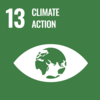Sparsholt College
Winner
Triangulating Green Skills - A multi-layered approach to encouraging the adoption of green skills and green technologies
The whole Sparsholt College Group model of delivery is based upon developing students who are trained to meet the needs of the workplace. As such, we develop students who have actively engaged with employers throughout their course of study through insight visit, guest lectures and work placements and we practice the vocational skills needed in the workplace in our training environment to develop competence.
In short, our model of operation is ensuring our students are competent at the point of entry to the workplace and able to provide added value to the workplace beyond the core requirements of the qualifications that we offer.
Added value in terms of Green Skills are delivered by:
- Providing all students with additional Green Skills learning materials hosted on the Innovation South Virtual Campus site, including courses in Carbon Literacy, Domestic Retrofit, Sustainable Resource Management, Sustainable Food, Renewable Energy, Tree Planting and more.
- Providing students and employers access to green technologies to provide for exposure and market confidence.
- Making green skills courses available to future employers and employees to prompt the modernisation of sustainable workplace practice.
- Facilitating workplace sabbaticals for teaching staff to ensure that teaching is informed by modern industry practice and need.
- Retraining academic staff and providing them with green skills learning materials to update their knowledge and reduce the challenge (hence delay) of the incorporation of green skills in delivery.
What the Judges Thought
An exemplary project which seeks to equip students with appropriate Green skills to support their future employment as well as encouraging the removal of barriers to the adoption of green technologies in business. The collaborative project engages employers, students and the local community and makes learning materials highly accessible through an accessible, on-line platform. As well as helping tomorrows employees adopt more sustainable behaviours, the project also has a positive impact by raising awareness in local business of adopting more sustainable approaches.
Top 3 Learnings
- Whilst learning materials were developed for students/tomorrow’s workforce, we learned that sustainability learning materials and the need for exposure to green technologies have multiple potential users. As green skills and technologies are not widely embedded in the UK, the same learning and exposure to new technologies needed by students are as useful to their future employers, their teachers and the current workforce.
- Learners respond favourably to the provision on unregulated learning which allows the user to pick and choose from the information that they need. A true digital library, without condition of use, is liberating and improves the relationship between employers, employee, student and colleges. It provides a method to extend the student’s knowledge beyond main aim qualification in a way that the student does not feel overextended. It also introduces the concept of lifelong learning resources.
- The development of centralised, consortium-based, open-source learning materials provides for major savings in public expenditure, improves size of the audience with access to learning (hence addresses UK skills shortfalls, particularly in the adoption of green skills and green tech) and serves to drive up quality and breadth in learning content.

